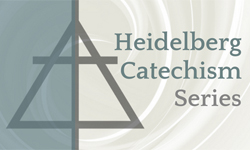A series of sermons which is currently underway. Sermons will be added when available.
Series Theme:
This series looks at the doctrines of Scripture while following the outline of the Heidelberg Catechism.
This catechism is divided into 52 Lord’s Days as it was intended for one Catechism Lord’s Day section to be covered each Sunday in the worship of the congregation.
The first question and answer deals with the theme of what is our only comfort in life and death. The answer given centres on the fact of ‘belonging to Christ’. It is this focus that provides the title for this sermon series.
Readings reproduced on this page:
The Holy Bible: New International Version. 1996, 1984. Grand Rapids: Zondervan

Readings
Heidelberg Catechism
LD 25 QA66
Q. What are sacraments?
A. Sacraments are holy signs and seals for us to see.
They were instituted by God so that by our use of them He might make us understand more clearly the promise of the gospel, and might put His seal on that promise.1
And this is God’s gospel promise:to forgive our sins and give us eternal life by grace alone because of Christ’s one sacrifice finished on the cross.2
1. Genesis 17:11; Deuteronomy 30:6; Romans 4:11
2. Matthew 26:27-28; Acts 2:38; Hebrews 10:10
Text
Romans 4 (NIV84)
1What then shall we say that Abraham, our forefather, discovered in this matter?
2If, in fact, Abraham was justified by works, he had something to boast about—but not before God.
3What does the Scripture say? “Abraham believed God, and it was credited to him as righteousness.”
4Now when a man works, his wages are not credited to him as a gift, but as an obligation.
5However, to the man who does not work but trusts God who justifies the wicked, his faith is credited as righteousness.
6David says the same thing when he speaks of the blessedness of the man to whom God credits righteousness apart from works:
7“Blessed are they whose transgressions are forgiven, whose sins are covered.
8Blessed is the man whose sin the Lord will never count against him.”
9Is this blessedness only for the circumcised, or also for the uncircumcised? We have been saying that Abraham’s faith was credited to him as righteousness.
10Under what circumstances was it credited? Was it after he was circumcised, or before? It was not after, but before!
11And he received the sign of circumcision, a seal of the righteousness that he had by faith while he was still uncircumcised. So then, he is the father of all who believe but have not been circumcised, in order that righteousness might be credited to them.
12And he is also the father of the circumcised who not only are circumcised but who also walk in the footsteps of the faith that our father Abraham had before he was circumcised.
13It was not through law that Abraham and his offspring received the promise that he would be heir of the world, but through the righteousness that comes by faith.
14For if those who live by law are heirs, faith has no value and the promise is worthless,
15because law brings wrath. And where there is no law there is no transgression.
16Therefore, the promise comes by faith, so that it may be by grace and may be guaranteed to all Abraham’s offspring—not only to those who are of the law but also to those who are of the faith of Abraham. He is the father of us all.
17As it is written: “I have made you a father of many nations.” He is our father in the sight of God, in whom he believed—the God who gives life to the dead and calls things that are not as though they were.
18Against all hope, Abraham in hope believed and so became the father of many nations, just as it had been said to him, “So shall your offspring be.”
19Without weakening in his faith, he faced the fact that his body was as good as dead—since he was about a hundred years old—and that Sarah’s womb was also dead.
20Yet he did not waver through unbelief regarding the promise of God, but was strengthened in his faith and gave glory to God,
21being fully persuaded that God had power to do what he had promised.
22This is why “it was credited to him as righteousness.”
23The words “it was credited to him” were written not for him alone,
24but also for us, to whom God will credit righteousness—for us who believe in him who raised Jesus our Lord from the dead.
25He was delivered over to death for our sins and was raised to life for our justification.


